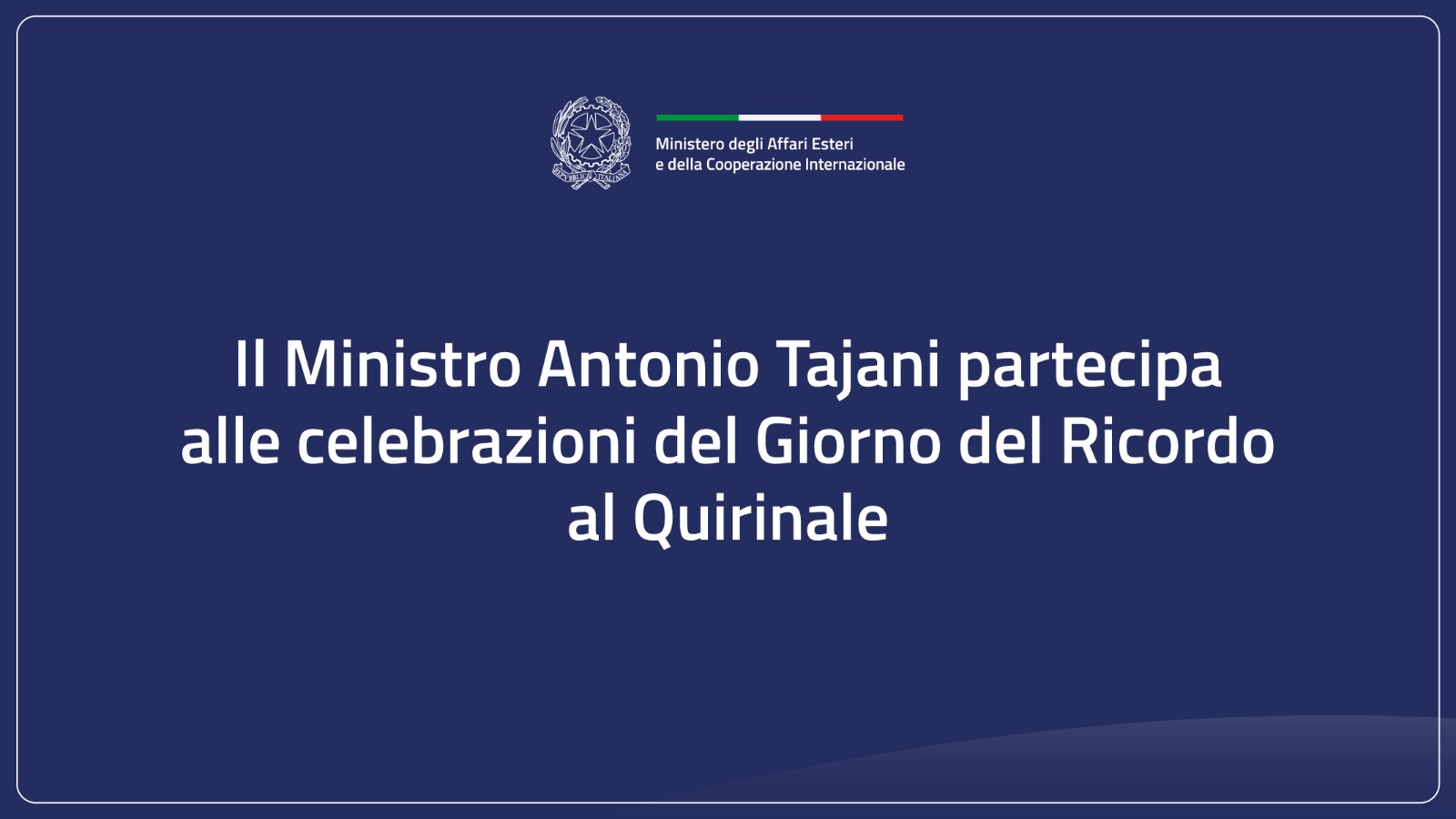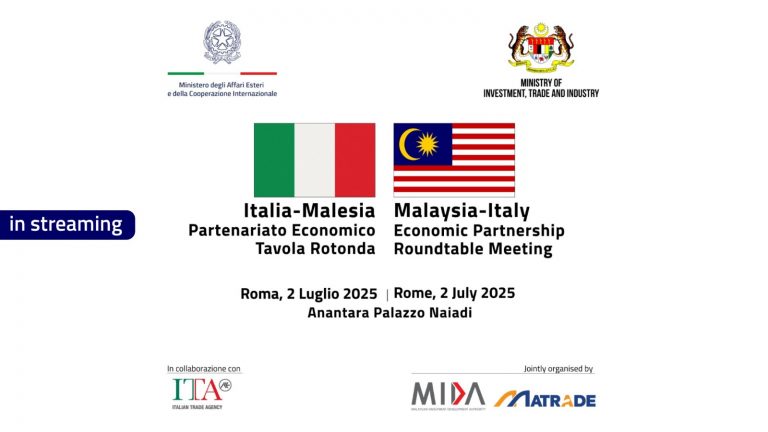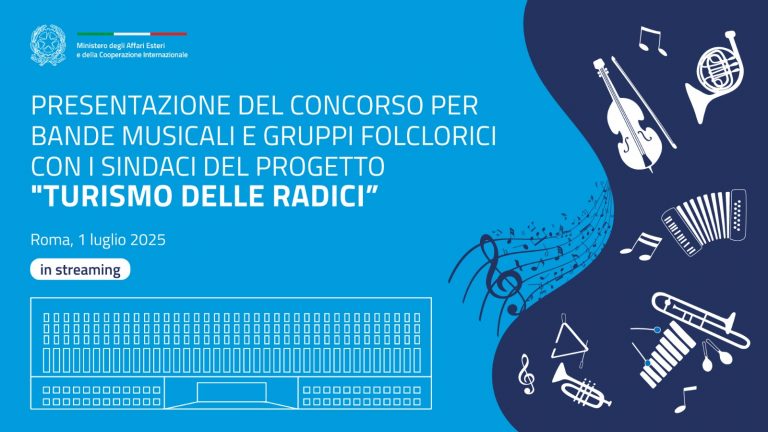Italy’s Deputy Prime Minister and Minister for Foreign Affairs and International Cooperation, Antonio Tajani, took part in the ceremony to commemorate the Italian National Memorial Day of the Exiles and Foibe. The commemoration, organised at the Quirinal Palace, closed with a speech by the President of the Italian Republic, Sergio Mattarella.
President of the Republic,
Authorities,
Ladies and Gentlemen,
on the National Memorial Day of the Exiles and Foibe, we stand in ideal contemplation before every foiba, memorial stone or monument – and the many plain wooden crosses that dot the red soil of Istria, marking the places where the wounds in the ground that swallowed thousands of unfortunate people opened, in what is one of the darkest chapters of Italian history.
Those people had a name, which disappeared in the depths of the abyss because of fury and hatred that appear even more abominable and senseless today, as time has passed.
The fallen include officers from Guardia di Finanza, the police, the Carabinieri, and public security guards. There were also many ordinary people, such as pharmacists, lawyers, notables, teachers, professors, doctors, shopkeepers, priests, nuns, people of faith.
A fundamental component of the society of Julian March was swallowed up by hatred. Hundreds of thousands of people were forced to exodus, carrying on their shoulders an unspeakable burden of pain.
The wall of oblivion has been torn down. The veil of silence has been ripped. Finally, the names of the many who fell have emerged from our past – and with them, their stories.
Just think of Don Francesco Bonifacio, whom the Church beatified in 2008, who was stripped naked, beaten, barbarically murdered and thrown into a foiba aged only 34, or Don Angelo Tarticchio, who was taken from his rectory and murdered after long torture together with 43 of his parishioners, whose body was found with a crown of thorns made of wire on their head.
And then, of course, there were the women. Just think of the three Radecchi sisters, Fosca, Caterina and Albina, aged 16, 19 and 21, who were taken in the middle of the night from their home, tortured and then thrown alive into the foibe, or Alice Abbà, who was only 13 years old when she was kidnapped and murdered together with her mother, after her father, a traffic policeman, had also been killed.
Let us remember those who were forced to abandon their homes and villages in the name of an ideology and hatred towards Italians.
The tragedy of the foibe, and the subsequent Istrian-Dalmatian exodus, were true acts of ethnic cleansing.
In those months, at the end of a tragic conflict, the most abhorrent forms of nationalism and totalitarian ideology merged to dig a bloody furrow among the peoples of the eastern shore of the Adriatic. Those same peoples had coexisted for centuries, in a complex yet fruitful harmony for those lands and those peoples.
Unfortunately, the foibe were not the only act of ethnic cleansing that plagued the Balkans in the 20th century. On the contrary, they can be said to have anticipated other tragedies, which half a century later would accompany the dissolution of the former Yugoslavia. But of course, that is the tragedy that concerns us most closely, one that grips us most painfully.
That is why the Italian government decided to commemorate this day in 2004, as a fitting tribute to the victims and as a warning so that such tragedies would not be repeated.
Remembering is a moral, civil and political duty, but it does not in any way mean reopening ancient conflicts. The people responsible for those massacres were individuals who have long since disappeared, members of an armed force, the expression of a now dissolved State – the Yugoslav Partisans, led by Marshal Tito – inspired by an ideology defeated by history.
The states that have replaced the former Yugoslavia bear no responsibility for the violence of that time.
They are friendly allies, starting with Slovenia and Croatia, who share our civil choices, our democratic system, and our membership of the European Union and the Atlantic Alliance. And it is precisely history that shows us the importance of EU enlargement in the rest of the Western Balkans.
Remembering that season of conflict through materials now available to all, enables us to appreciate even better the great value of peace and of the fruitful and cordial coexistence between peoples who are different but united by a common European identity.
That is where the great value of Europe lies, the reason that makes us so deeply, wholeheartedly pro-European. It is the great dream of Adenauer, Schuman, De Gasperi, leaders of nations that had fought bitterly against each other until a few years before and decided to take a common path towards a different future – one that after 1989 also involved many countries and peoples of Europe that until then had been separated by the Iron Curtain.
Those who, like me, remember with a sense of anguish the years when Gorizia was referred to as Italy’s Berlin, the years when a problematic border separated it from Nova Gorica, a city with a different sovereignty, have no difficulty in understanding the extent of what has happened over the past 35 years.
Those who, like me, remember the symbol of that division – Transalpina Square in Gorizia – which was divided in two by an insurmountable wall, cannot help but feel deeply moved as they freely walk through that same square today, where nothing but a mark on the ground recalls past divisions, where Italians and Slovenes move freely, without barriers, opposition or animosity, with the desire to build a shared Europe that is truly capable of declaring its firmest opposition to massacres, persecutions, wars and tragedies such as the foibe.
The sacrifice of the Italian victims will not have been in vain if it serves as a warning to today’s and tomorrow’s generations.
And the very moment in which you, the President of the Republic, shook the hand of Slovenian President Pahor, right at the site of the Basovizza foiba, which I will be at tomorrow to lay a laurel wreath, the symbolic site of the tragedy, was the highest point of this path of reconciliation, collaboration, and joint work on memory and the future.
Dear President,
It means embracing the fallen of that time, those who were forced to leave their homes, and their descendants, who keep the pain of those dramas and tragedies alive in their hearts, in the shadow of the Italian flag.
With it comes to them, our only duty is one of mercy, respect and remembrance.
But memory also confronts us with great responsibility.
Today, new shadows are looming over peace. The peaceful, rules-based international order is called into question in many areas of the world, and also on our continent.
Now more than ever, Europe and the Atlantic Alliance face decisive challenges in shaping what the world will be like in the decades to come.
Working for just peace that upholds the rights of peoples and the sovereignty of nations is the only way we can truly declare our firmest opposition to tragedies like the one we are remembering today, and therefore also to honour the victims of the foibe, in the name of mercy and forgiveness, with only one modus operandi, that of leading by example and reconciliation.






